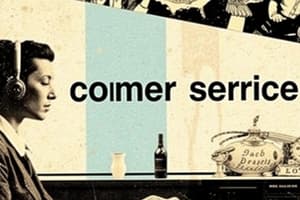Podcast
Questions and Answers
What is a payday loan?
What is a payday loan?
- A loan that must be paid back in full on the borrower's next payday (correct)
- A loan that is used to purchase a home
- A loan that is used to purchase equipment or start a new business
- A loan that is used to cover unexpected expenses
What is the main disadvantage of payday loans?
What is the main disadvantage of payday loans?
- High interest rates
- Short repayment period
- Risk of getting into a cycle of debt
- All of the above (correct)
What is a credit card?
What is a credit card?
- A payment card that allows you to borrow money from a financial institution (correct)
- A loan that is used to purchase a home
- A loan that is used to purchase equipment or start a new business
- A loan that is used to cover unexpected expenses
What is the main difference between a credit card and a payday loan?
What is the main difference between a credit card and a payday loan?
What is rent to own?
What is rent to own?
What is an installment loan?
What is an installment loan?
What is the length of an installment loan?
What is the length of an installment loan?
What is the best option for a consumer loan with a small balance?
What is the best option for a consumer loan with a small balance?
What is the difference between a consumer loan and a business loan?
What is the difference between a consumer loan and a business loan?
Flashcards are hidden until you start studying
Study Notes
- A payday loan is a type of short-term borrowing where a lender provides a borrower with a cash advance that is intended to be paid back on the borrower's next payday.
- Payday loans are often used by people who are in a financial bind and need money quickly.
- While payday loans can be a convenient source of short-term cash, they can also be a trap for people who find themselves in a cycle of debt. Borrowers who cannot repay the loan on time may be charged additional fees and interest, which can make it even harder to pay off the loan.
- In some cases, borrowers may end up taking out another payday loan to pay off the first one, leading to a cycle of debt that can be difficult to break.
- A credit card is a payment card that allows you to borrow money from a financial institution or credit card company to make purchases. When you use a credit card to buy something, you are essentially taking out a loan from the card issuer, which you must repay with interest if you do not pay off the balance in full by the due date.
- Credit cards typically have a credit limit, which is the maximum amount you can borrow at any given time. The credit limit is determined by the credit card company based on your creditworthiness, income, and other factors. You can use your credit card to make purchases up to the credit limit, and you can repay the balance in full or over time with interest.
- Rent to own allows customers to lease a product for a set period of time with the option to own the item at the end of the lease term. Here's how the program typically works:
-
- Choose a product: The first step is to choose the product you want to lease. Tempoe offers a range of products, including electronics, appliances, furniture, and more.
-
- Apply for lease: Once you've selected a product, you can apply for the lease-to-own program online or in-store. Tempoe will conduct a quick credit check to determine if you qualify for the program.
-
- Set lease term: If you're approved, you'll be able to set the lease term, which can range from 12 to 24 months, depending on the product. You'll also be given an affordable monthly payment based on the price of the product and the lease term.
-
- Make payments: Once you've signed the lease agreement, you'll start making monthly payments. These payments will be automatically deducted from your checking account or credit card on file.
-
- Option to own: At the end of the lease term, you'll have the option to purchase the product for a nominal fee. If you choose to exercise this option, the product will be yours to keep.
- It's important to note that the lease-to-own program is not a loan, and there is no interest charged. Instead, you're
- installment loans can be used for a variety of purposes, such as buying a car, paying for home repairs, consolidating debt, or covering unexpected expenses
- installment loans typically have higher monthly payments but lower overall interest costs
- when considering an installment loan, it's important to carefully review the terms and conditions of the loan agreement, including the interest rate, fees, and repayment schedule, to ensure that it's a good fit for your financial situation
- examples of common types of installment loans include personal loans, auto loans, student loans, and home equity loans
- the length of an installment loan can vary, but it's typically anywhere from a few months to several years
- when cashing a check, it's important to be familiar with the different settlement criteria available, as some companies require 50% upfront payment before approving a check, while others require only a small down payment or no payment at all
- there are a variety of payday loan companies available, each with its own terms and conditions
There are three types of loans: consumer, business, and mortgage.
Consumer loans are for everyday expenses like groceries and rent, while business loans are used to purchase equipment or start a new business. Mortgage loans are used to purchase a home.
Lenders offer different types of loans based on the borrower's credit score and other factors.
When you take out a loan, you need to settle the debt by either making regular payments or through a settlement process.
If you have a small balance on a consumer loan, it is best to avoid the supervisor. If you have a large balance, you can go to the store to get the money. Finally, always request a payment plan or make payments on a schedule that fits your budget.
Studying That Suits You
Use AI to generate personalized quizzes and flashcards to suit your learning preferences.




